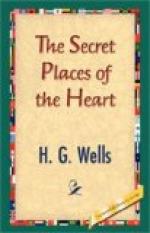He made several not very well-devised beginnings. At the fifth Sir Richmond was suddenly conclusive. “It’s no use,” he said, “I can’t fiddle about any more with my motives to-day.”
An awkward silence followed. On reflection Sir Richmond seemed to realize that this sentence needed some apology. “I admit,” he said, “that this expedition has already been a wonderfully good thing for me. These confessions have made me look into all sorts of things—squarely. But—I’m not used to talking about myself or even thinking directly about myself. What I say, I afterwards find disconcerting to recall. I want to alter it. I can feel myself wallowing into a mess of modifications and qualifications.”
“Yes, but—”
“I want a rest anyhow....”
There was nothing for Dr. Martineau to say to that.
The two gentlemen smoked for some time in a slightly uncomfortable silence. Dr. Martineau cleared his throat twice and lit a second cigar. They then agreed to admire the bridge and think well of Maidenhead. Sir Richmond communicated hopeful news about his car, which was to arrive the next morning before ten—he’d just ring the fellow up presently to make sure—and Dr. Martineau retired early and went rather thoughtfully to bed. The spate of Sir Richmond’s confidences, it was evident, was over.
Section 4
Sir Richmond’s car arrived long before ten, brought down by a young man in a state of scared alacrity—Sir Richmond had done some vigorous telephoning before turning in,—the Charmeuse set off in a repaired and chastened condition to town, and after a leisurely breakfast our two investigators into the springs of human conduct were able to resume their westward journey. They ran through scattered Twyford with its pleasant looking inns and through the commonplace urbanities of Reading, by Newbury and Hungerford’s pretty bridge and up long wooded slopes to Savernake forest, where they found the road heavy and dusty, still in its war-time state, and so down a steep hill to the wide market street which is Marlborough. They lunched in Marlborough and went on in the afternoon to Silbury Hill, that British pyramid, the largest artificial mound in Europe. They left the car by the roadside and clambered to the top and were very learned and inconclusive about the exact purpose of this vast heap of chalk and earth, this heap that men had made before the temples at Karnak were built or Babylon had a name.
Then they returned to the car and ran round by a winding road into the wonder of Avebury. They found a clean little inn there kept by pleasant people, and they garaged the car in the cowshed and took two rooms for the night that they might the better get the atmosphere of the ancient place. Wonderful indeed it is, a vast circumvallation that was already two thousand years old before the dawn of British history; a great wall of earth with its ditch most strangely on its inner and not on its outer side; and within this enclosure




